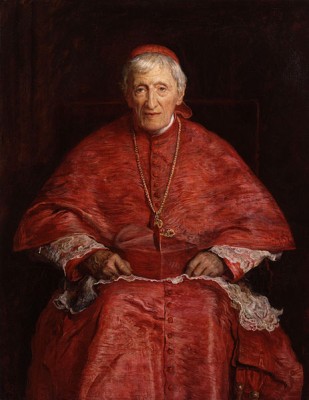Why are parents most effective at handing down faith to their kids?
Let’s answer that question with another question. How has the Church has been so effective in handing down faith through the centuries?
Blessed John Henry Cardinal Newman asked that question in the mid 1800’s. Newman was a very prominent Anglican clergyman and Oxford scholar in England who converted to Catholicism after his study of the writings of the early Church.
He concluded, "It has been upheld in the world not as a system, not by books, not by argument, nor by temporal power, but by the personal influence of such men as...are at once the teachers and patterns of it.”
Personal influence is the deciding factor...the presence and personal example of the teachers who do the handing on.
The Power of the Concrete
England was rife with Anti-Catholic sentiment in the 1850. This coincided with the reestablishment Catholic clergy after hundreds of years. Newman championed a cause against it through a series of apologetical lectures. In one he noted a curious thing.
Misinformation and stereotypes about the Church circulated around the country. But it originated mainly from places like London where people didn't personally know Catholics. In the neighborhoods where Catholic clergy lived, it was a different story.
In a satirical tone he emphasized this fact:
"The Birmingham people will say, 'Catholics are, doubtless, an infamous set, and not to be trusted, for the Times say so, and Exeter Hall, and the Prime Minister, and the Bishops of the Establishment; and such good authorities cannot be wrong; but somehow an exception must be made for the Catholics of Birmingham…Priests in general are perfect monsters; but here they are certainly unblemished in their lives, and take great pains with their people. Bishops are tyrants, and…cut throats, always excepting the Bishop of Birmingham, who affects no state or pomp, is simple and unassuming, and always in his work."
What was the difference? Personal influence. It’s easy to believe stereotypes and hate someone when you’ve never met them. The distance creates an abstract idea, a generalized notion. Experience of the concrete individual changes the way you think and act. It's harder to hate someone you live next to or work with as opposed to a stereotype.
The concrete was the key to Cardinal Newman’s methodology of personal influence. Whenever possible he drew people away from the general, theological presentation of truths. He wanted his audience to experience a topic concretely, and have them feel how it applied to them personally, not just generally. The personal, the concrete, had the power to effect people and change the way they think and act.
Parents and Personal Influence
So what does all this have to do with parents and children’s faith formation? Everything.
It’s common practice for parents to send kids to religious education classes or Catholic school and never talk about faith at home. Really, the parish sets up this situation, and many parents like it that way. If you do this, however, you’re missing out on the most effective means of forming your children in the Faith--your own personal influence and the concreteness of everyday life.
Faith lived within the home, as part of family life, is concrete, it’s personal. Parents know their kids better than anyone else. They can tailor lessons to their child’s specific needs. They can celebrate feast days and holy days with special devotions and foods. They can apply faith discussions to daily life and take advantage of opportunistic catechesis--extra instruction around life events.
Why is this important?
We're moved to action more through concrete experience than though intellectual abstraction. Universals and general notions leave us as spectators.
If we remain distant with spiritual truths, our religious commitment remains distant and unengaged as well. The more we apprehend the world and other persons in all their concreteness, the more personally engaged we become and the more capable of personally change.
Parents are the greatest influence in their children’s lives, and have the greatest potential for making faith concrete for them. That’s why parents are most effective at handing down faith to their children, and why their role should never be replaced.
Copyright 2013 Marc Cardaronella
About the Author

Marc Cardaronella
Marc Cardaronella is the author of Keep Your Kids Catholic: Sharing Your Faith and Making It Stick from Ave Maria Press. Marc directs catechist and discipleship leader formation for the Diocese of Kansas City-St. Joseph, MO. He is married, has two teen boys, and writes about Catholic spirituality and how to share the Faith on his personal blog.



.png?width=1806&height=731&name=CatholicMom_hcfm_logo1_pos_871c_2728c%20(002).png)
Comments